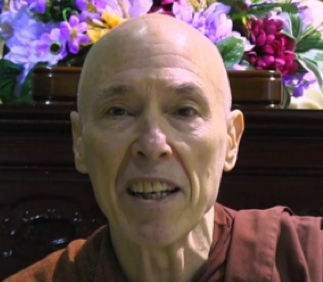 Last week, Bhikkhu Bodhi led us through a meditation called “Recollection of the Buddha,” in which he asked us to reflect on three of nine traditional qualities ascribed to the Buddha. These three are:
Last week, Bhikkhu Bodhi led us through a meditation called “Recollection of the Buddha,” in which he asked us to reflect on three of nine traditional qualities ascribed to the Buddha. These three are:
araham: one free from all mental defilements and thereby liberated from the round of rebirths
samma sambuddha: one who has penetrated the truth and taught others about the true nature of things and the path to its realization
bhagava: the one endowed with numerous excellent qualities who compassionately takes on the role of teacher
Some community members expressed an aversion to elevating and venerating the Buddha in this way. “I think of the Buddha as a human being,” one commenter writes, “not as some supernatural being that sounds Godlike. He was a man, became a monk, and then was enlightened. Why do we need to elevate him to ‘perfect knowledge’ and ‘immaculate conduct’?” Another retreat participant concurs:
[I am feeling] lots of cynicism that I did not realize that I had about the Buddha. Statements such as ‘perfect knowledge’ and ‘immaculate conduct’ raise immediate objections in my mind. Personally, I tend to look at the teachings as somehow separate from him. When the teachings begin to discuss his qualities I glaze over them a bit as overstatement or exaggeration.
Bhikkhu Bodhi replies:
In traditional Buddhist countries devotional practices and contemplations play a prominent role. This came to me as something of a surprise when I first arrived in Sri Lanka, nurtured on the books on Theravada Buddhism written by English-educated Sri Lankan monks and Western writers. It takes patience for a Westerner (especially one brought up in a secular household or one reacting against dogmatic religion) to become accustomed to this aspect and learn to appreciate it. In my case, it came fairly naturally to me, since I had strong confidence in the Buddha from the time when I first became interested in Buddhism.
Please also remember that there is no compulsion to adopt a devotional approach, and certainly not to accept anything on blind faith! If this approach does not resonate with you, there are other roads of practice one can embark on, more impersonal and devoid of religious elements. Or, if one is game to try the devotional approach, one can lay aside such adjectives as “perfect” and “immaculate” and instead focus on the Buddha in simpler terms: as one who is freed from mental defilements (araham); who has understood the path to true well being and happiness and release from suffering (samma sambuddha); and who compassionately took on the role of teacher (bhagava). This might make it more comfortable without calls exceptional faith and devotion.
Bhikkhu Bodhi’s retreat on “The Four Protective Meditations” continues this week with a teaching on “Lovingkindness.” This practice might be more familiar to many of us than “Recollection of the Buddha,” but don’t be surprised if Bhikkhu Bodhi presents “Lovingkindness” in a way that isn’t completely familiar.
The next three weeks of Bhikkhu Bodhi’s retreat are available exclusively to Supporting and Sustaining Members of the Tricycle Community. Watch a preview of “Lovingkindness” below.
Thank you for subscribing to Tricycle! As a nonprofit, we depend on readers like you to keep Buddhist teachings and practices widely available.